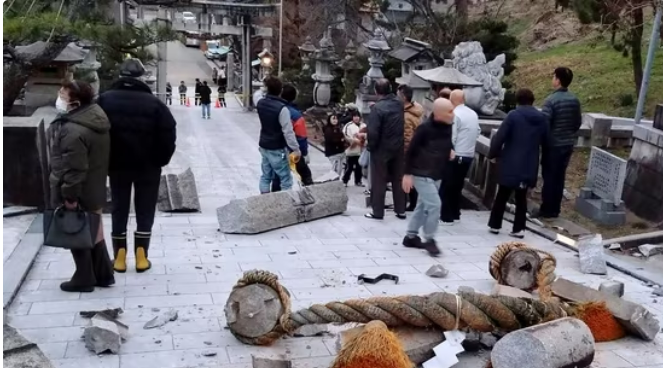
Live Updates on Japan Earthquake: Japan Meteorological Agency Continues to Detect Tsunamis.
Live News Update on Japan Earthquake: Urgent Advisory to Seek Higher Ground or Top of Nearby Buildings
In a recent development, a significant earthquake with a preliminary magnitude of 7.6 struck north-central Japan on Monday afternoon. Following the seismic activity, the Japan Meteorological Agency promptly issued a tsunami warning for the coastal regions of Ishikawa, Niigata, and Toyama prefectures.
The agency reported a quake impacting Ishikawa and adjacent prefectures, with one registering a preliminary magnitude of 7.4. Wajima City in Ishikawa Prefecture experienced waves exceeding 1 meter in height, as reported by NHK.
NHK TV cautioned that water torrents could reach up to 5 meters (16.5 feet) and urgently advised individuals to swiftly move to higher ground or the top of nearby buildings. As of now, there are no immediate reports of any casualties or damage.
This occurrence brings back memories of the devastating 9.0-magnitude undersea quake in March 2011, off northeastern Japan, resulting in a tsunami that claimed approximately 18,500 lives. Additionally, in March 2022, a 7.4-magnitude quake off the coast of Fukushima caused significant impact in eastern Japan, resulting in three casualties. The historical seismic vulnerability of Japan is underscored by the devastating earthquake that struck Tokyo a century ago in 1923.
Stay Updated on Japan Earthquake:
- The Japan Meteorological Agency reports ongoing detection of tsunamis, highlighting the importance of adhering to evacuation measures.
- Tsunami warnings have been issued for Ishikawa, Niigata, and Toyama coastal regions by the Japan Meteorological Agency (JMA).
- In a span of slightly over 90 minutes, central Japan experienced a sequence of 21 earthquakes with a magnitude of 4.0 or higher, with the most powerful registering a magnitude of 7.6. Authorities advise relocation to higher ground in affected areas.
- South Korea’s east coast experiences a tsunami, and North Korea issues warnings anticipating waves exceeding 2 meters.
- ‘Major Tsunami Warning’ for the Noto region in Japan is downgraded to a ‘Tsunami Warning.’
- The U.S. Pacific Tsunami Warning Center states that the tsunami threat from the earthquake has largely passed after waves over a meter high hit some areas.
- The Fire Department in Ishikawa Prefecture receives at least 30 reports of building collapses.
- Over 36,000 households lose power in Ishikawa and Toyama prefectures.
- Russia issues tsunami warnings in its far eastern regions, including parts of Sakhalin Island, Primorsk, and Khabarovsk.
- The Indian Embassy in Japan sets up an emergency room and issues contact numbers for assistance.
- South Korea’s Gangwon province advises evacuation to higher ground, and the first tsunami wave reaches a height of 45 cm.
- Tsunami waves over a meter high hit central Japan, damaging homes and prompting evacuations.
- Residents are seen evacuating to higher ground following tsunami warnings in Wajima.
- Russia’s Sakhalin island and Vladivostok are on alert for a possible tsunami risk.
- The earthquake marks the first time a seismic intensity of 7 is recorded in Ishikawa prefecture.
- Shinkansen bullet train services between Tokyo and the epicenter in the Noto region are suspended.
- Major highways around the epicenter are closed, disrupting transportation.
- The Pacific Tsunami Warning Center issues alerts for parts of Russia and North Korea.
- Japan’s Prime Minister instructs the government to provide guidance and assess damages.
- A tsunami warning is issued for parts of Russia and North Korea.
- A rapid succession of quakes hits the Noto region, prompting a government spokesperson to warn residents of possible further quakes.
- Another earthquake of magnitude 5.7 hits the western coast of Honshu, causing power outages for over 36,000 houses.
Latest Updates on Japan Earthquake:
RT reports a suspension of all high-speed trains in Ishikawa Prefecture.
Inspection of nuclear power plants is underway, with Hokuriku Electric Power checking for irregularities. Kansai Electric Power reports no abnormalities at its nuclear facilities but is closely monitoring the situation.
NHK confirms a 1-meter high tsunami along the Sea of Japan coast, with expectations of a larger wave. High-speed train services in Ishikawa Prefecture have been halted, as per RT.